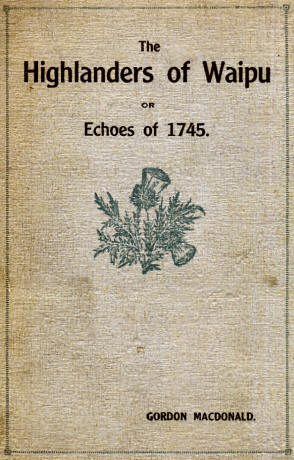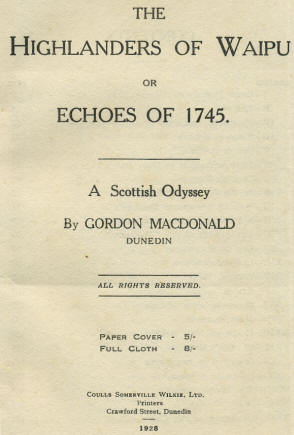

Preface
THE author in his youth
resided in the district from which many of the ancestors of the people
of Waipu hailed. There he heard many harassing tales of the cruelties
and hardships inflicted upon the people during the eviction period in
Scotland (1780-1840). Many shiploads of helpless people were sent into
the wilds of America without funds or preparations of any character, but
they trusted in God to rescue them.
It was the custom in
those days, and for many years afterwards, for the common people to
select some suitable neighbour as their letter writer. In the author’s
day the local schoolmaster happened to be their amanuensis, and upon the
teacher’s removal the office fell to him. In this capacity he gradually
came to know most of the private and public affairs of a wide district.
He also corresponded on their behalf with many of their relatives
scattered throughout the English-speaking world. Little did he dream in
those far-off times that some day he would see some of the descendants
of these people in America, Africa, Australia, and New Zealand.
He first came to know of
Waipu and its people from a Mr. D. McKenzie, of Roslyn, Dunedin, in the
‘eighties of last century. Mr. McKenzie was born in Nova Scotia and was
one of the Waipu migrants. About the same time a Captain D. McLeod
visited Dunedin as master of a ship chartered by the Shaw, Savill Co.
The author had occasion to visit the ship, and found the Captain to be a
Gaelic-speaking Nova Scotian. He made enquiries regarding Waipu and its
people, said he came from St. Anns, Nova-Scotia, and was related to some
of the Waipu people.
Some time afterwards the
Rev. D. McLennan was settled in Chalmers Presbyterian Church, Dunedin.
Mr. McLennan had just come from Waipu, where he had been settled as
minister for several years, and so he knew Waipu and its people well.
The stories of these
gentlemen regarding the extraordinary experiences of the Waipu people so
interested him that he determined to visit them. In the course of his
investigations he paid several visits to the Auckland Province, and made
the acquaintance of many of the people. Amongst those to whom he is
principally indebted for information are the following ladies and
gentlemen:Mrs. Isobel McKay, Waipu; Mrs. D. McLeod, Waipu; Mrs.
J. McDonald, Auckland; Mrs. A.
Cockburn, New Plymouth; Mrs. B. Stevens, Maungatapere; Miss C. McLennan,
The Cove, Waipu; Miss H. Ross, Waipu; Messrs.
J. D. McKenzie, Whangarei; J. R. McKay,
Secretary Gaelic Society, Waipu; Mr. J. M. McKay, Chief Caledonian
Society, Waipu; A. Kempt, The Braigh, Waipu;
D. H. Mclnnes, The Braigh,
Waipu; J. A. Morrison, Waipu; J. McLean, Waipu; E. Campbell, Waipu; C.
D. McDonald, Waipu; and M. Fraser, New Plymouth; all of whom were born
in Nova Scotia and are fluent Gaelic speakers. . Some of them could
relate events in Nova Scotia, Australia, and New Zealand with equal
facility. In. addition to the above may be mentioned Mrs. Griffiths, an
English lady, and wife of the late Rev. Mr. Griffiths, of the
Congregational Church, who ministered to a section of the Waipu people
during some differences in the Presbyterian Church.; also the Rev. E.
Andrews, M.A., lately minister in the Presbyterian Church, Waipu, the
Rev. D.. D. Scott, of Onebunga, and clerk of the Auckland Presbyterery,
and O. N. Campbell, Esq., Commissioner of Crown Lands, Auckland, who is
a descendant of one of the original Nova Scotian settlers. Besides
these, a large number of the New Zealand generation gave valuable
information regarding events in early New Zealand times.
The Highland people are somewhat
reticent in matters concerning themselves, and it is probable that had
not the author known something of their history prior to their leaving
Scotland, and had he not been able to converse with them in the native
tongue, he would not have elicited much information from them.
No consecutive story of the
movements and experiences of these early settlers has hitherto been
written. Fragmentary articles have appeared from time to time in the
Auckland press. An anonymous pamphlet termed "The Idyll of the
Ship-builders," Clark and Mathieson, Auckland, has been published, but
it. is undated and unacknowledged. A book written by F. W. Wallace,
Hodder and Stoughton, London, entitled "Wooden Ships and Iron Men,"
makes reference to the building of the ships at St. Anns, Cape Breton,
but gives no details. Mr. John R. McKay, Secretary of the Gaelic
Society, Waipu, has written several articles in the local press
descriptive of the district and the habits and customs of the people.
Mr. J. D. McKenzie, Whangarei,
began the writing of a book descriptive of the whole movement, but
business and other reasons compelled him to abandon the work. Mr. J.
Munro, Whangarei Heads, the diplomatist and politician of the
settlement, compiled a list of all the families who took part in the
migration, together with their designation and location in and around
Waipu.
From all these sources
the author has obtained some information, and to all of them he begs to
make due acknowledgment. In reading the story it will be observed that
Christian Socialism had been the ideal of their leaders, both in Canada
and New Zealand. This ideal, however, is fast disappearing, while the
ordinary community life of the country is taking its place.
Owing to the cost of
publication in New Zealand and the trade anomalies surrounding it, the
book has been curtailed; while some photographs, maps, and pictures have
had to be excluded. The author receives nothing for all his labours, but
he is anxious to keep faith with such of the people of Waipu as supplied
the necessary information, though their support has been limited.
It is well known that the
Government of New Zealand assists in the publication of local works of
an historic or scientific character. The Premier, when appealed to in
1926, willingly promised to assist in its publication; but when it came
to action in 1927 he declined assistance without comment.
Owing to the lapse of
time and the different versions of the same incidents given by different
individuals, it is possible that some errors may have crept into the
narrative. Even so the story
is well worth preserving, for it reveals one of the most courageous
episodes in British history. The boundless trust in God of these people,
their indomitable courage, their heroic perseverance, their devotion to
their leader, and their final success, richly deserve a niche in the
annals of our country.
R.G.M., M.D.
DUNEDIN,
January, 1928.
This issue is limited to
500
copies, most of which have been sold
to friends abroad; the remaining copies are on sale in the shops of the
Otago Bible Society, Dunedin, Wellington, Invercargill.— Price,
5s.
Contents
-
Early History of the British
Isles
-
The '45
-
Feudalism Abolished
-
Norman McLeod
-
Off to America
-
First Settlement in Nova Scotia
-
Call to Ohio
-
St. Ann's: A New Settlement
-
Norman Returns to St. Ann's
-
A Startling Letter from Adelaide
-
The Sailing of the "Margaret"
-
Off to Maoriland
-
Landing at Waipu
-
Wedding Bells
-
Arrival of the "Gertrude"
-
Relations with Maoris
-
More Migrants
-
Death of Mrs. McLeod
-
St. Ann's Deserted
-
Isolation of the People
-
Death of Norman
-
The Waipu Jubilee
-
Waipu To-Day
-
Character of the Celt
-
Pictures of Waipu
Visit the Waipu Heritage Centre
Visit
The Waipu Caledonian Society Inc
Got a note in from Betty Powell, Genealogist at the Waipu Heritage
Centre.
This was printed in
Whangarei newspaper “The Northern Advocate” from
their column ‘50 Years Ago This Week’. Printed in 1983,
unfortunately I only have the year for this one not the day and month.
The following is the article...
1933
Looking even fitter than he did
12 months ago, the chieftain of the Waipu Caledonian Society, Mr J
J Finlayson, enjoyed the sports this week
quite as much as any of the younger generation. Mr Finlayson was
present at the first meeting held in William McKenzie’s paddock 62
years ago, and has only missed one gathering since.
At present Mr Finlayson is
engaged in collecting the history of “The Highlanders of Waipu”. The
author, the late Mr Gordon McDonald, of Dunedin, made a fine
achievement of his altruistic task, but the difficulties of collecting
and collaborating the history of the
emigration were many. Mr McDonald never sent his manuscript to Waipu
for correction, and a number of errors are said to have crept in.
No one is better fitted to revise
the work, the copywright of which is
believed to have lapsed, than Mr J J
Finlayson, who was born at Waipu 76 years ago. In his work of
alteration and addition he is being assisted by Mr H S McKay, a
retired schoolteacher.
|

